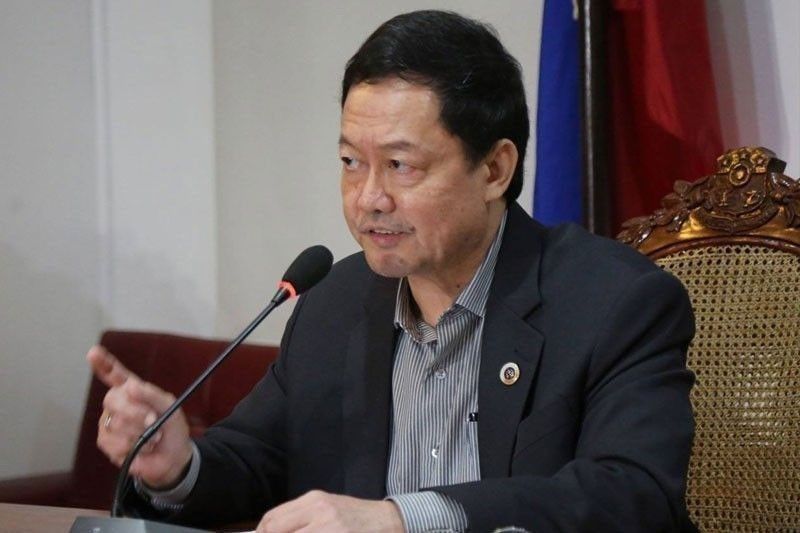DOJ to discuss implementing rules of anti-terrorism law on Friday

MANILA, Philippines — Department of Justice officials will meet on Friday to discuss the implementing guidelines for the Anti-Terrorism Act of 2020, Secretary Menardo Guevarra said.
“The DOJ team will meet tomorrow to brainstorm and identify the provisions of the ATA that will need Implementing Rules and Regulations,” he said.
The DOJ chief said they will also confer with the legal team of the Office of the President and with the secretariat of the Anti-Terrorism Council as they “go along” the crafting of the IRR. Under the Anti-Terrorism Act, the National Intelligence Coordinating Agency acts as the council's secretariat.
Republic Act 11479 or the new anti-terrorism law is facing at least 16 challenges to its constitutionality at the Supreme Court.
The Malacañang said that Republic Act 11479 took effect on July 19, or 15 days from when a copy of the law was uploaded on the Official Gazette website—although some petitioners contest this and said the law became effective on July 22.
They argued that the publication on the website does not count, but the publication on at least two newspapers of general circulation—a publication on the Office Gazette print on July 6—does.
Solicitor General Jose Calida, the chief legal counsel of the government, has the same stance as some of the petitioners and said the law took effect on July 22.
In any case, Calida maintained that even while the IRR is still being crafted, “the ATA is already in force.”
Calida: New anti-terrorism law in effect without IRR
Calida said in a statement also Friday that the promulgation of an IRR is not a prerequisite for the effectivity of the law and its pendency cannot “defer the law from coming into force.”
"A law is presumed to be valid when there exists an interpretation favorable to its effectivity. Unless there are clear and unmistakable showing of the law’s constitutional and statutory infirmity, the presumption of validity subsists, and the law is binding and effective," the solicitor general said.
He also said that while operational details need to be laid down for “proper implementation of the law,” RA 11479 does not have a provision that prohibits its implementation sans an IRR.
Except for Sections 45 and 52, the rest of the law is self-executing, Calida explained.
The two provisions define the Anti-Terrorism Council, and the Management of Persons Charged under the law—which tapped the Bureaus of Jail Management and Penology, and Corrections for putting up the said system—respectively.
“To claim that the law is ineffective until implementing rules are promulgated creates an absurd situation where an agency can delay the effectivity of the law by delaying promulgation of its rules,” Calida said.
“To argue that a law is less than a law, because it is made to depend on a future event or act, is to rob Congress of its plenary power to act wisely for the public welfare,” he added.
Guevarra earlier said it would be “more prudent” to wait for the IRR. Interior Secretary Eduardo Año agreed but said that if there is a terrorist threat, then they would have to apply the law.
President Rodrigo Duterte signed the Anti-Terrorism Law on July 3 despite opposition from rights groups and civil society groups that it could be used to stifle human rights.
A petition against the law has been filed at the Supreme Court and other groups are preparing pleadings of their own.
Follow this page for updates. Photo courtesy of The STAR/Michael Varcas
National Security Adviser Hermogenes Esperon moves to block access to several websites, including news sites of alternative news orrganizations Bulatlat.com and Pinoyweekly.org.
In his letter to the National Telecommunications Commission, he only says the websites are "affiliated to and are supporting these terrorists and terrorist organizations."
No other basis to back up his allegation was cited in the letter.
Citing the designation of the CPP-NPA-NDF as terrorists, NSA Hermogenes Esperon moves to block access to several sites.
— Kristine Patag (@kristinepatag) June 22, 2022
In Esperon's letter to the NTC, he included news sites @bulatlat and @pinoyweekly; sites of other progressive groups RMP and Save our Schools. @PhilstarNews pic.twitter.com/nAzMITJFsS
The Commission on Human Rights says it "partly welcomes" the Supreme Court decision that some parts of the controversial Anti-terrorism Law are unconstitutional.
CHR spokesperson Jacqueline de Guia says the commission remains hopeful that the remaining contentious provisions of the law will be clarified by the high cour in the full text of the decision.
"At the same time, our commitment remains in guarding against possible human rights violations arising from the implementation of the anti-terror law. We steadfastly remind the government that countering terrorism and protecting human rights are not competing values but are, in fact, mutual and complementary," De Guia says in a statement.
The Supreme Court has deliberated and voted on the controversial Anti-Terrorism Act but the decision will be released "at the soonest time possible."
"However, considering that there were numerous issues resolved in the case, as well as the fact that each Justice had to vote on each issue, there is a need to accurately confirm and tally the vote of each Justice in order to ensure the correct resolution of the Court per issue," SC spokesperson Brian Hosaka says.
The Anti-Terrorism Council designates the National Democratic Front of the Philippines, the panel that negotiates for communist rebels during peace talks a terrorist organization.
Previous designation of the Communist Party of the Philippines and New People's Army led to the designation of supposed members of the CPP's Central Committee. Among those designated as terorrists were peace consultants.
Designation gives the Anti-Terrorism Council the authority to investigate and freeze the accounts of designated persons.
The Anti-Terrorism Council has designated 29 people, including alleged members of the Communist Party of the Philippines-New People's Army, as terrorists in two resolutions.
Designation allows the Anti-Money Laundering Council to freeze the assets of those on the list.
- Latest
- Trending





























